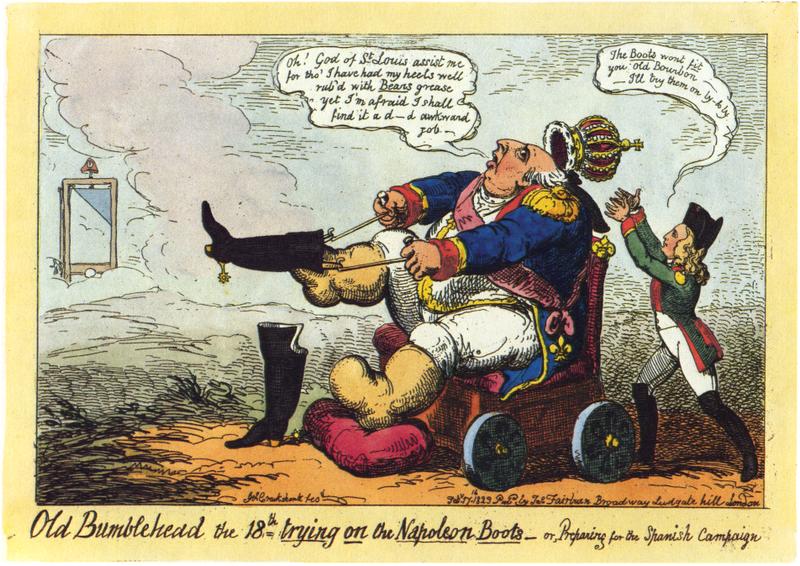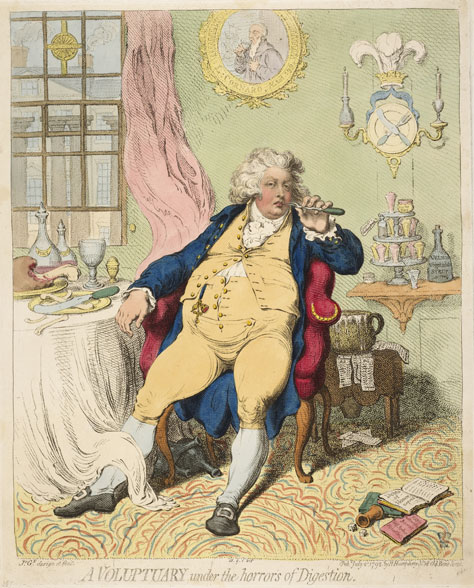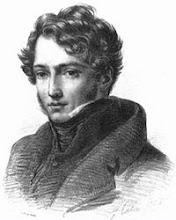 He was born at Bath into a Congregationalist family, but moved at the age of ten to London, where he worked at first as a lawyer’s clerk. By the age of sixteen he had joined the London Corresponding Society, and had become a cynic in religion. In 1792, Hone takes his first adult position as "factotum" for solicitor in Bishopsgate Street.
He was born at Bath into a Congregationalist family, but moved at the age of ten to London, where he worked at first as a lawyer’s clerk. By the age of sixteen he had joined the London Corresponding Society, and had become a cynic in religion. In 1792, Hone takes his first adult position as "factotum" for solicitor in Bishopsgate Street.Hone disliked the law and was employed by the booksellers as auctioneer to the trade, and had an office in Ivy Lane. Independent investigations carried on by him into the condition of lunatic asylums led to business difficulties and failure. In order to keep himself and his large family fed he contributed to magazines and reviews.
An unflattering caricature of George IV of the United Kingdom as Prince Regent, by George Cruickshank, illustrating "The Political House that Jack Built" by William Hone
In 1815 he started the Traveller newspaper, and tried in vain to save Eliza Fenning, a cook convicted on thin evidence of poisoning her employers with arsenic. Although Fenning was executed, Hone's 240 page book on the subject, The Important Results of an Elaborate Investigation into the Mysterious Case of Eliza Fenning was a landmark in investigative journalism it also demolished the prosecution's case.
This is typical of satire for which Hone would be tried
From 1 February to 25 October 1817, Hone published the Reformists' Register, using it to criticise state abuses, which he later attacked in the famous political squibs and parodies, illustrated by George Cruikshank. In April 1817 three ex-officio informations were filed against him by the attorney-general, Sir William Garrow.

THE CLERICAL MAGISTRATE by William Hone
Three separate trials took place in the Guildhall before special juries from th 18th to 20th of December 1817. The first, for publishing The Late John Wilkes's Catechism of a Ministerial Member (1817), was before Mr Justice Abbot (afterwards Lord Tenterden); the second, for parodying the litany and libelling the Prince Regent in The Political Litany (1817), and the third, for publishing the Sinecurist's Creed (1817), a parody on the Athanasian Creed, were before Lord Ellenborough.
.

Alphabet for Beginners by William Hone
The prosecution took the ground that the prints were harmful to public morals and brought the prayer-book and even religion itself into contempt. The real motives of the prosecution were political: Hone had ridiculed the habits and exposed the corruption of those in power. He went to the root of the matter when he wished the jury "to understand that, had he been a publisher of ministerial parodies, he would not then have been defending himself on the floor of that court." In spite of illness and exhaustion Hone spoke on each of the three days for about seven hours. Although his judges were biased against him, he was acquitted on each count, and the result was received enthusiastically by immense crowds inside and outside the court. William Hone a truly brilliant fellow.
A lovely week to you all.
My love and care,
Simone

















Lol, I do love satirical pics now and again
ReplyDeleteMy dear Simone!-)*
ReplyDeleteI like these ''Alphabet for Beginners'' very much,SO good a nd SO right!!!
I take all these words for in my computer on the workpage,thank you,my dear friend!
Such a great person was this William Hone!-)))
Much Love and warm hugs,
***Violetta***
I'm ashamed to say that I have scarcely (if at all) heard of him until now (but I recognise most of the cartoons) and did not know he was born here in Bath. Thanks for the interesting info, Simone.
ReplyDeleteInteresting post, I enjoyed "Alphabet for Beginners." Thanks for sharing.
ReplyDeleteComing to your blog, I can always be sure to learn something that I won't have otherwise. Thanks for making me smarter.
ReplyDeleteLike fellow Englishman Tom Stephenson, I have hardly heard his name. However, his sounds like a life 'Honed' to perfection. Obviously an important historical figure!
ReplyDeleteBisou, Cro.
Interesting! We don't hear much about him in America, so it's nice to read this. Wonderful as always.
ReplyDeleteQe don't hear much about him in the UK either Amy - I blame the Murdoch family.
ReplyDeleteQ = W
ReplyDeleteAnother fascinating character. Thanks for sharing, Simone!
ReplyDeleteHe sounds like an extraordinary man. And new to me. Thanks.
ReplyDeleteThanks Simone! William was cool! And that alphabet is wonderful.
ReplyDeletexoxo
The early bird catcheth the worm is so true.
ReplyDeletei just noticed something (it has nothing to do with this post): Dumas Davy de la Pailleterie. Ive only read one his novels The Count of Monte Cristo. Loved it.
ReplyDeleteI have been away and have missed your blog!
ReplyDelete